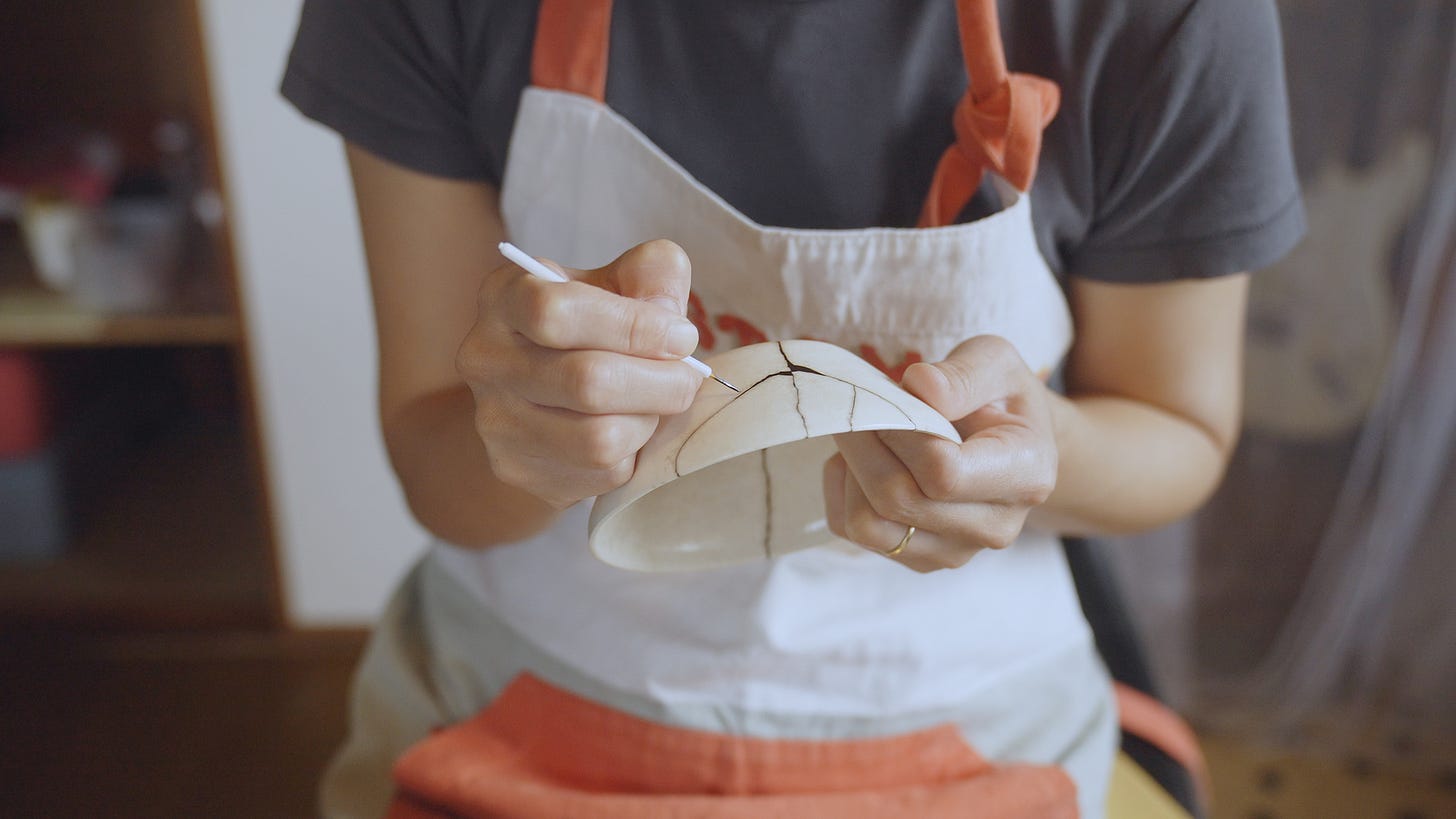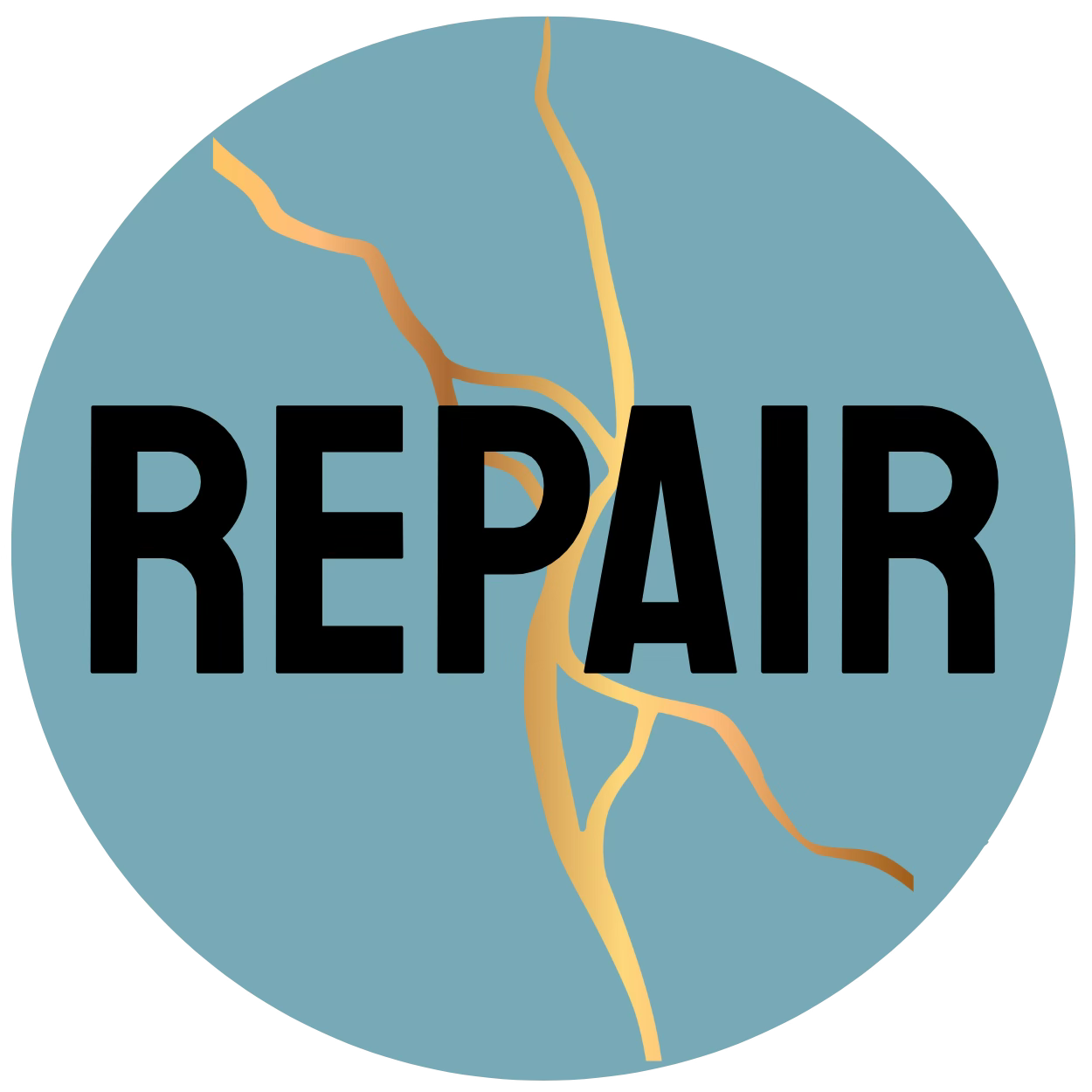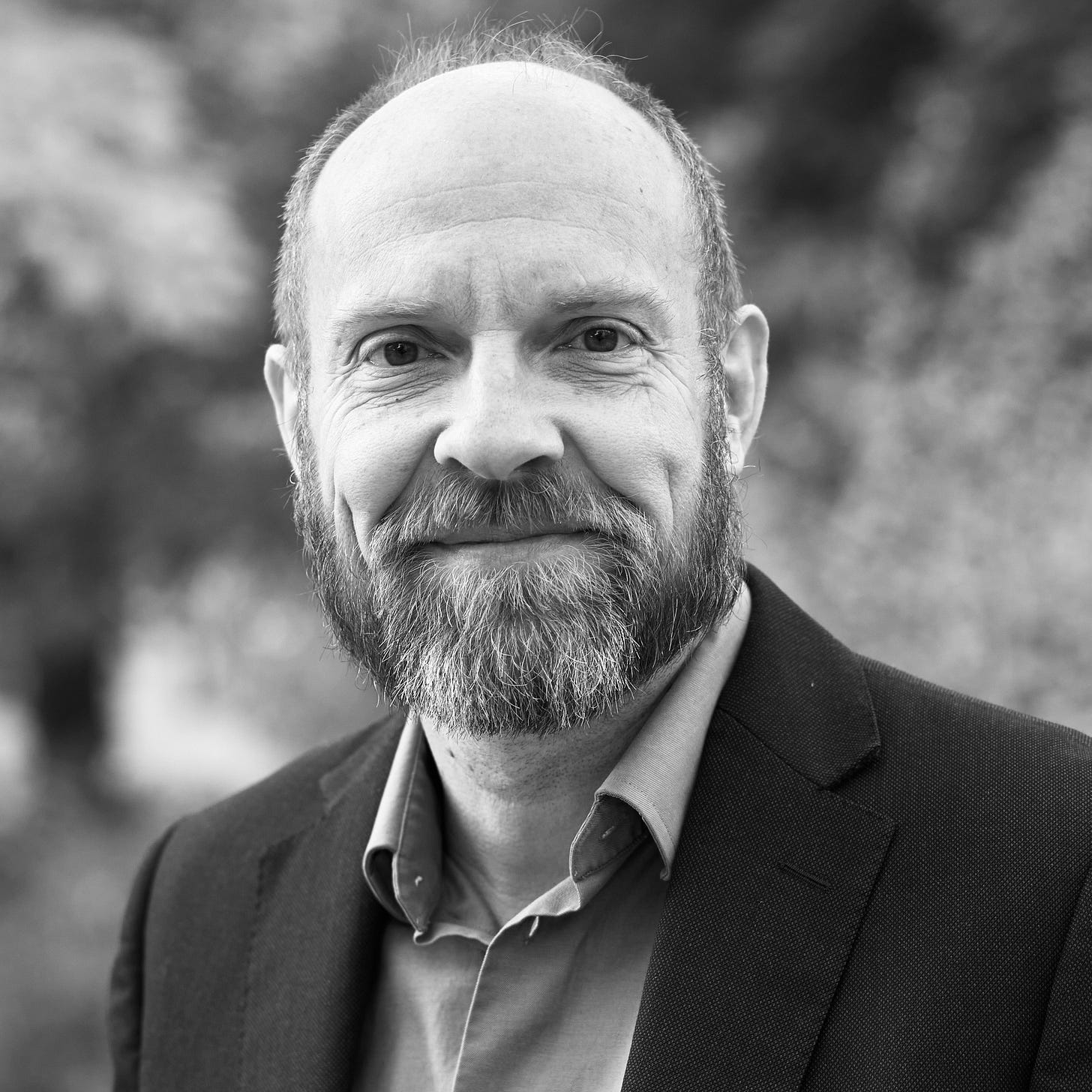Chad Ford: "The Mindset and Skills of Repair"
Want to heal a conflict in your life? Here are some tools, inspired by the Japanese art of kintsugi, I use as a mediator & conflict coach
Kintsugi, the Japanese art of repairing broken pottery with gold, is more than a skill—it’s a mindset. Instead of hiding the cracks, kintsugi highlights them, transforming brokenness into beauty and strength. The mindset behind kintsugi is one of honesty, patience, and reverence for what has been fractured. The skill set requires attentiveness, careful restoration, and a willingness to embrace imperfection as part of the story.
The mindset and skills of kintsugi are part of the inspiration of the Repair Conference and are reflected in our logo.
Repair is rooted in the belief that peacebuilding is not about erasing wounds or pretending conflict never happened. Reconciliation means acknowledging the breaks in our relationships, communities, and systems, and working with care and courage to mend them in ways that create something stronger and more authentic. Like kintsugi, peacemaking does not return us to what was before—it makes possible a new wholeness, one where scars become sources of wisdom and even beauty.
I’ve served as a conflict mediator for decades in family, organizational, and international conflicts and worked with hundreds of people to help them transform contempt into respect, differences into innovation, and polarization into cooperation.1
Peacemakers aren’t born.
They train.
They learn how to change the way that they see conflict and the people they are in conflict with AND they spend time acquiring and practicing the skills that will help them successfully navigate conflict in every area of their life.
Patrick Mason and I created Waymakers because we want to make both the mindsets and skills of peacemaking more accessible to folks. While we’d love for you to come study with us at the Heravi Peace Institute at Utah State, we know that taking classes, getting certificates, let alone doctorates, isn’t going to be easy for most people.
So how do regular people become peacemakers? They keep the right mindset about conflict and strive to turn the most destructive conflicts into collaboration.
Mindset
1. Everyone has conflict. Peacemakers embrace that conflict is normal, healthy, and a fact of life. Successful relationships, families, organizations, communities, and congregations do not lack conflict. We don’t need to fear conflict or feel like we are in the wrong marriage or community because everyone doesn’t see eye to eye. When conflict arises, peacemakers recognize that at its heart, conflict is the inability to collaboratively solve problems. There is no sin in that. Conflict doesn’t have to turn contentious. Good can and will come from transversing conflict constructively.
2. Peacemakers don’t avoid conflict; they step into it. Transforming conflict into collaboration should be a priority for any anyone who is in a relationship - whether that’s at home, at work or in the world. Of the five major styles for handling conflict (avoid, accommodate, compete, compromise, and collaborate), I’ve found that the predominate style is avoidance. When people avoid conflict, it festers; and they signal to others that conflict is scary or problematic. When a conflict can no longer be avoided, many people resort to either accommodation (if they desire to be loved) or competition (if they prioritize being right). Neither of those styles are ideal in our personal and social relationships. The best peacemakers see conflict as an opportunity to engage, listen, take in new ideas, and wrestle with problems until they find solutions that work for everyone (collaborate). They see conflict as an opportunity to grow and innovate, not as a flaw or something to be avoided. Want to know your conflict style? You can take a test here.
Peacemaking Skills
1. Prioritize relationships. All conflict is relational. People thrive or wither depending on the health and strength of their relationships. Organizational leadership guru Jim Ferrell has worked with Withiii to show that when we approach conflict as a relational problem and not just an individual or structural problem, the quicker and more easily we get to the root of conflicts and break down barriers to collaboration. Strong relationships revolve around respecting differences, sharing information, working together harmoniously, and making collaborative decisions. If your relationships are fractured, you must start there.
2. Listen to learn. Conflict often turns destructive because we make assumptions about those we disagree with. Often, we assume people resist us, instead of our ideas, and we attach bad motives. When we do this, we falsely see others and invite the very situation we assumed: they resist us and not just our ideas. When people disagree, ask questions. Lots of them. Seek to go deeper. Listen to others’ positions and then find out the “why” behind them. Why are they interested in pursuing a different path? What values are informing their position? How do they define these values or pursue them? What sort of cultural and religious worldviews might be affecting how they see the issue or the conflict? What needs are they concerned about fulfilling?
3. Don’t call others out—call them in. If someone in a relationship has engaged in bad behavior, we may be tempted to either ignore it (avoid) or crush the person. Do neither. Calling them out severs a relationship. But calling them in for a conversation invites people to be accountable for their actions by reaffirming that their actions affect everyone in the organization. Lorretta Ross writes:
“[Calling out is] the tendency . . . for people to want to publicly shame and humiliate people. . . . It’s attaching labels to people without really doing any kind of nuance. Without understanding that even if you disagree with someone, you shouldn’t want to attack their humanity. . . . [Calling in is] done with love and respect. Because you’re really seeking to hold people accountable for the potential harm that they cause, but you’re not going to lose sight of the fact that you’re talking to another human being. And so you extend a hand of active love and active listening to help them.”
4. Invite reconciliation. There’s a tendency for people to want to settle conflict as quickly as possible by agreeing on a solution and moving on without addressing the underlying relational issues. We do so at our own peril. We might temporarily “solve” a problem only to have it resurface again and again. Problem solving isn’t really problem solving without reconciliation. Conflict mediator Donna Hicks (in her outstanding book, Leading with Dignity) writes:
“The glue that holds all of our relationships together is the mutual recognition of the desire to be seen, heard, listened to, and treated fairly: to be recognized, understood, and to feel safe in the world. When our identity is accepted and we feel included, we are granted a sense of freedom and independence and a life filled with hope and possibility.”
When people don’t feel seen, listened to, or treated fairly, the quickest way to reconcile this is to give them the very thing they feel deprived of. When we ensure that during conflict employees feel recognized, understood, and safe, we improve mental health, retention, culture, productivity, and business performance.
5. Lead by example. Peacemakers are leaders. If you haven’t been listening, start listening. If you’ve offended someone, apologize. If you’ve made a mistake, own it. If you turned a disagreement into a personal attack, call yourself in and reframe it. Leaders set the culture for their organization. How peacemakers handle mistakes, disagreements, and conflict will set the tenor for an entire family, organization, or congregation. In fact, peacemakers should ideally be practicing these principles consistently for three months before teaching them to others they think “need” it. When we model peacemaking, others will learn from our example.
Want to learn more about acquiring a peacemaking mindset and skills? Come join me at our inaugural gathering, REPAIR, on October 23-25 in Provo, Utah. I will be teaching four workshop at REPAIR.
"Dangerous Love: Navigating Cultural and Political Conflict"
FRIDAY, OCT 25 @8:30 am
Workshop Description: Do you feel that the cultural and political divides prevalent in our society are negatively impacting your relationships at home, within your ward, in your community, and at work? Are you grappling with conflicts between MAGA and Progressives, Israel and Palestine, LGBTQIA+ and traditional family values? If so, come learn the mental frameworks and tools employed by mediators to effectively navigate the most challenging and intractable issues in our lives.
We will learn how to better see people we disagree with. We will learn how not to withhold love and, instead, learn tools to collaboratively solve problems together. Expect lots of role plays, personal experiences, and a change of heart about your “enemies.”
"Mediation 101: How to Help Others Transform Conflict"
FRIDAY, OCT 25 @2:00 pm
Workshop Description: Do you ever find yourself caught in the middle of a family member, friend, co-worker, or ward member, struggling to help them navigate destructive conflict and find constructive peace? This course equips you with essential mediation skills, including conflict styles, reframing, discursive listening, and collaborative problem-solving tools.
Through engaging role-playing exercises, you’ll gain practical experience and become a more effective peacemaker in your personal and professional life. And it’s the first step into becoming a mediator in life.
"70x7: Navigating Conflict Jesus’s Way"
SATURDAY, OCT 26 @8:30 am
Workshop Description: Are you a Christian faith leader (such as a Pastor, Stake President, Bishop, Relief Society President, or youth leader) who feels overwhelmed by the conflicts your congregation is struggling with? Whether these conflicts are internal, familial, or larger cultural and political divisions within your congregation, Jesus provides us with powerful tools to help us and others find peace amidst external turmoil. Based on the book “70x7: Jesus’s Path to Transforming Conflict,” discover the tools that will enable you and others to navigate conflict successfully, as Jesus did.
"Preserving Love in Faith Transitions" with Chad Ford, Patrick Mason and Katie Searle
SATURDAY, OCT 26 @2:00 pm
Workshop Description: Faith transitions can be complex, emotional, deeply personal, and bring shifts in relationships. Whether you’re navigating your own, or walking alongside someone in theirs, this workshop creates a safe, respectful space to explore these journeys with honesty and compassion. Guided by multiple facilitators who have lived on all sides of the experience, we’ll share stories, practice tools, and build skills that help transform potential conflict into opportunities for deeper understanding, connection, and mutual respect.
Together, we’ll learn how to hold space for ourselves and others in ways that honor each person’s path and preserve what matters most—love.
We will also have a bunch of other amazing peacebuilders — a keynote by Jim Ferrell and workshops by Jennifer Finlayson-Fife, Thomas McConkie, Jennifer Walker Thomas, and Emma Addams from MWEG, Desmond Lomax, LaShawn Williams, David Pulsipher, Seamus Fitzgerald, Amanda Ford, Melissa Mason and One America — to help you navigate the most challenging conflicts in your life.
Come to one workshop. Or, go to all four. Find peace inside, at home, or in your ward or community. And connect with a bunch of other people who really care about making peace in the world.
Want to get a head start?
Check out my Where Peace Begins video entitled, Hello to Conflict!
BIO: Ford is an international conflict mediator, facilitator, and peace educator. While most people know him for his work at ESPN, being a basketball analyst and writer was actually his side-gig for most of the last two decades. Chad’s peacebuilding work is what defines him. Chad served as the Director of the David O. McKay Center for Intercultural Understanding at BYU-Hawaii. for nearly twenty years where he created a major and certificate program in intercultural peacebuilding. In 2024, Chad left his position at BYU-Hawaii to join the faculty at Utah State University. Chad is serving a joint appointment with the Religious Studies department and the Heravi Peace Institute.
His first book, Dangerous Love, weaves Chad’s experiences into a deeply personal step-by-step exploration of how we transform fear and conflict. His second book, 70x7, draws on Chad’s experiences as a Christian peacebuilder to show us how Jesus’s path of practicing 70×7 has the power to repair relationships by transforming destructive conflict into constructive peace. Chad has his own substack newsletter called the Waymaker if you want to follow his latest writing, podcasts and events.
Dave Ulrich, Rensis Likert Emeritus Professor, University of Michigan and Partner, The RBL Group and I recently collaborated on a LinkedIn post on how the best leaders handle conflict. This is an adaptation of that post to apply to non-business and HR leaders. If you’d like to see the original post directed at business and HR leaders, click here.






The kintsugi metaphor for repair mindset is beautiful, tangible and vulnerable. Interestingly, I've used kintsugi pottery to teach a growth mindset in language classes with Japanese students. Many students between 18-30 are unfamiliar with kintsugi pottery and philosophy. One student in her 40s, who is an environmental engineer, suggested that perhaps younger generations have grown up in a more disposable era. Her insight gives me pause to consider a cultural, generational shift that spills over into our relationships and how willing we are as a global family to value and learn the skills to repair relationships.